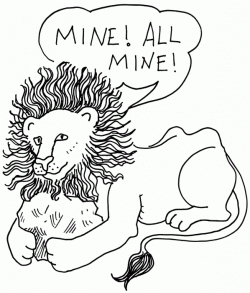Lion's share: It doesn't mean what you think
Q. When will a lion settle for a lion's share? –J. Adamson
A. Depends on which "lion's share" you're talking about, says Mark Davidson in Right, Wrong, and Risky. The phrase is commonly used to mean "the largest portion," such as when The Financial Times stated that "a mere 30 of Egypt's 300 book publishers receive the lion's share of the industry's profit."
But no self-respecting lion would settle for partial spoils, as can be gleaned even from one of Aesop's Fables. According to the story, a lion organized a hunt with a goat, a sheep, and a heifer; then declared that all four portions of the captured meat would be entirely his: one-quarter for his personal share, a quarter for his mate and cubs, a quarter for organizing the hunt, "and as for the fourth portion, let him who will, dispute it with me." The other animals, intimidated by the lion's frown, left him to take his "share."
Enough said. In its original use, "lion's share" meant "all" or "leaving nothing to be desired." So be careful how you use this expression around those knowledgeable about the origins of literary metaphors, advises Davidson.
Q. What's going on these days to throw a whole new light on the old Frank Drake equation for estimating the probability of alien civilizations in space? –D. Spock
A. That well-known equation (1961) argues for a galaxy full of sentient life, yet no artificial signal has been detected, and we wonder why, says Huntsville, Ontario letter-writer Grant Hallman in Scientific American magazine. The implicit assumption is that such a civilization would emit radio signals we could both detect and recognize during its entire lifespan, but here on Earth, we can already see the failure of that assumption in two ways:
First, after less than a hundred years of beaming transmissions, the day of the 50-kilowatt broadcast antenna is ending, as our communications technology advances to coaxial, fiber-optic, and short-range low-power systems. Even geosynchronous satellite communication is aimed down, "parsimoniously covering only a portion of Earth's surface."
Second, every broadband medium is moving to a digital format with data compression, which removes redundancies– that is, any recognizable pattern in the signal– in favor of compact digital code.
"I can only conclude," Hallman writes, "that we could be sitting in the midst of a 'Galaxy-Wide Web' of alien chatter, which to us, without the algorithms to decode it, appears like noise."
Q. It was the scourge of the late 19th and early 20th centuries, blamed for 90 percent of all diseases, including baldness and premature senility. Dubbed the "universal menace," the "failure of civilization," the "foe of beauty," it was said to be why men failed at business and women at romance. "Autointoxication" may not be a household word today, but does its stepchild live on– in you? –X. Lax
A. Health officials and the public alike regarded the contents of the bowel as an ungodly filth, a "cesspit" threatening to poison the body from within, says Sharon Bertsch McGrayne in 365 Surprising Scientific Facts, Breakthroughs and Discoveries. Inner cleanliness became a mania of the 1920s, dictating use of brans, laxatives, cathartics, enemas, special exercises, elaborate gadgets, and even surgeries to remove or shortcut the large bowel.
"We of course are too sophisticated for such nonsense today,” McGrayne writes. “Even so, each year we (in the U.S.) spend hundreds of millions on laxatives and make millions of doctor visits, all because of constipation. Bran muffin, anyone?"
~
Send Strange questions to brothers Bill and Rich at [email protected]
